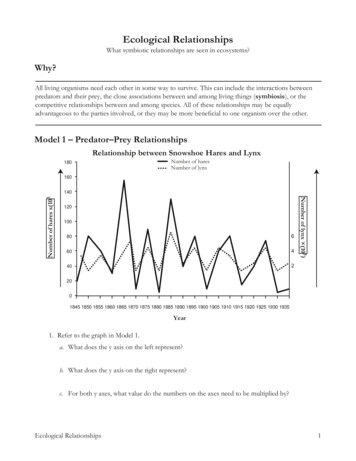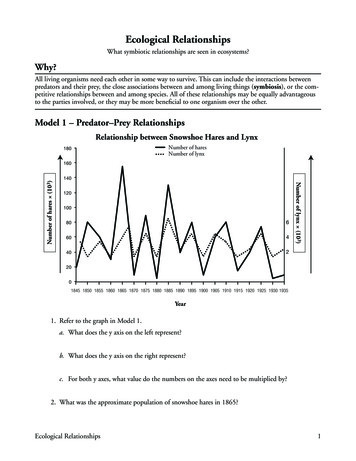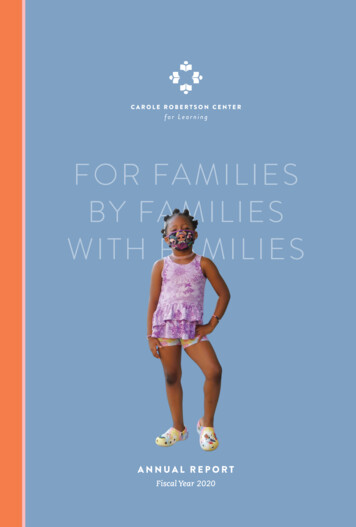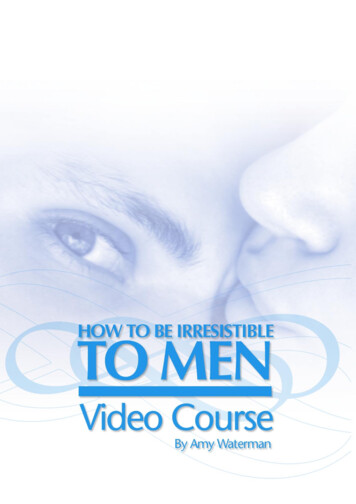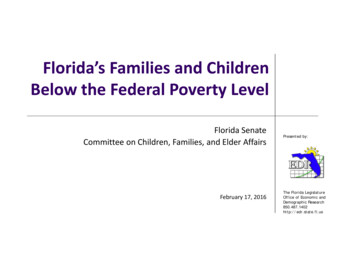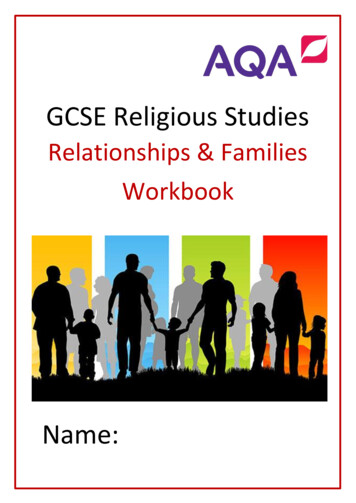
Transcription
GCSE Religious StudiesRelationships & FamiliesWorkbookName:
Sex and SexualityPeople have sex for many reasons: love, lust, fun, money, to create life, etc. Society’s views to sex havechanged over time – as it has done with most things, however you will need to know both secular (whatsociety says/does) and religious attitudes.Age of ConsentCelibacyHeterosexualityThis is when you are old enoughby law to choose to have sex. Itis sixteen for anyone. Of courseyou could have sex before then– but you aren’t consideredmature enough to beresponsible enough and it isagainst the law.This is when a person choosesto have no sexual partner.Either they decide to wait untilmarriage to have sex (chastity)or they will never marry andnever have sex (celibacy).People of opposite genders in arelationshipHomosexualityPeople of the same gender in arelationshipAdulterySex Before MarriageHaving an affair (a sexualrelationship) with someone whois not your marriage partner.Having a sexual relationshipbefore marriage. Some peoplefeel that marriage is no longerrelevant in today’s modernworld, choosing to cohabitinstead.
Tasks:1. Why might a person have sex? 2. What is the age of consent? 3. Why shouldn’t you have sex before the age of consent? 4. What is celibacy? 5. What is chastity? 6. What is heterosexuality? 7. What is homosexuality? 8. What is adultery? 9. What is ‘sex before marriage’? 10. Why might someone choose to have sex before marriage nowadays?
Contraception and Family PlanningContraception: Methods used to prevent a woman from becoming pregnant during or following sexual intercourseThere are two types of contraception: Natural contraception: This can include Natural Family Planning. This is when a person doesn’t havesex during the time of the month when they are most likely to become pregnant. Naturalcontraception also includes the Withdrawal Method, where the man ‘pulls-out’ before heejaculates. However this is an extremely unreliable method of contraception. Artificial contraception: These methods include the pill, injection or condom to preventcontraception.Christian Attitudes to ContraceptionMost Christians believe that only married couples should have sex and only witheach other. Chastity (not having sex until marriage) is a virtue. Attitudes to the useof contraception vary. In addition to views on contraception, there is a celibatetradition in Christianity for those who follow the monastic life, and the priesthood.Roman Catholic:The Roman Catholic Church believe that every sexual act must be within theframework of marriage; only married couples should have sex and the mostimportant reason for sex is to have children. There should be a chance ofpregnancy within every sex act. The Roman Catholic Church opposes artificialcontraception. However, population growth is currently a debate throughout the planet, so some Catholicswill consult their consciences when making a decision about using contraception.Sex before marriage is called fornication, and is a sin. The same goes for masturbation, because it cannotlead to pregnancy.For some Christians, homosexual sex is thought to be unnatural, and again cannot lead to pregnancy, so itis a sin. In places, the Bible also says it is wrong for a man to sleep with another man, which has also beenused to show homosexuality to be wrong.
Many Catholics also want to enjoy sex without the worry of having more children that they can’t look afteror afford.St. Thomas Aquinas developed a theory on Natural Law, which many Catholics consult when making moraldecisions. Aquinas said there are some fundamental laws laid down by God and are the basis of howhuman should live and carry out their lives. There are five primary precepts:1.2.3.4.5.Self-preservation/preservation of the innocentContinuation of the species through reproductionEducation of childrenTo live in societyTo worship GodFrom these primary precepts, Aquinas set outsecondary precepts that fulfil and maintain theprimary precepts. For example, the secondprecept says that we should reproduce,therefore contraception is wrong as it wouldprevent reproduction.Natural Law should always befollowed. If Natural Law statesthat we should continue thespecies, then contraception isgoing against that! - AquinasThe Catholic Church takes an absolutist view of Aquinas’s Natural Law, meaning that the rules Aquinas laiddown should always be followed. Therefore, contraception should not be used as it goes against NaturalLaw.Church of EnglandNatural Law is not an absolute set of laws, but a relative set of laws. God gave humans intelligence andcreativity so that they can use their consciences to decide what is right in any given situation. There mightbe some situations where using contraception is the moral and responsible thing to do, e.g. where theparents already have children and cannot afford any more, or when considering global over-population.In addition, contraception doesn’t just prevent pregnancy, but the spread of STIs/STDs, so it is a good thingfor this reason.For some Christians, the use of contraception is to be encouraged as it leads to responsible parenthood.HumanismContraception is allowed so that people canenjoy their lives and limit the size of families.Sex is regarded as an expression of humanaffection and love between two people andit has no religious or sacred aspect.Science should be used to improve thequality of life for human beings, therefore isthe use of contraception limits the size offamilies and leads to an improvement in thequality of life it should be used.
Tasks:1. What is natural contraception? 2. What is artificial contraception? 3. What do most Christians believe about contraception? 4. Explain in detail the Roman Catholic views about contraception. 5. Explain St. Thomas Aquinas’ Natural Law. 6. What do Church of England Christians believe about contraception? 7. What do humanists believe about the use of contraception?
Buddhist Attitudes to Sexual MattersSexuality has to be put aside. It is about desire and craving, whichthe Four Noble Truths explain we must stop if we want to achieveenlightenmentBuddhism, in all its forms, has a very strong celibate tradition, withmany monasteries and convents. The energy which might havebeen put into sexual activity is channelled into spiritual activity to tryto reach enlightenment. Having said that, there are many layBuddhists who live as families. Sex is seen as natural, but mostrewarding as part of a loving, caring relationship, so chastity isencouraged. Couples should use contraception to limit their familysize, and so practice family planning. This can also prevent the suffering of a new life, which is notforced to be born unwantedBuddhism encourages people to follow thePrecepts, including the Precept to avoid sexualimmorality, including adultery. Breaking the preceptwill lead to suffering, causing bad karma. Karma iswhat determined the quality of the next life.Buddhists so not condemn sex before marriage orhomosexuality, as long as it is part of a loving,caring relationship. Where sex is just based on lust,like a one-night stand, then this is craving, whichcauses bad karma.Tasks:1. What do Buddhists believe about sexuality? 2. Why is celibacy important in Buddhism? 3. In Buddhism, how is sex most rewarding? 4. What do Buddhists believe about contraception? 5. Which specific Precept does Buddhism encourage people to follow?
6. What will breaking the Precept lead to? 7. What do Buddhists believe about homosexuality or sex before marriage? Hindu Attitudes to Sexual MattersFor a Hindu man, life is split into four Ashramas or stages. Sexualrelationships can only happen in the second stage, which is that ofthe married householder (grihastha). For the other three stages, theman should remain celibate. This means that women also havesexual relationships only within marriage. Sex before marriage andhomosexuality are both against the religion. Sex is seen as a gift fromthe Ultimate Reality (God), and must be treated with care andrespect. It is for enjoyment and to have children.Chastity is important in Hinduism and all are expected to be virginsbefore marriage, with their only sexual partner being the person towhom they are married. Two important Hindu virtues are self-discipline and respect, and adulterygoes against both of these. Since adultery causes others to suffer, it brings bad karma to theadulterer, and negatively affects their rebirth.Hindus do not object to using contraception; rather,they encourage it. Family planning is stressed,though Hindus need to have a son to carry outcertain religious rituals and this often leads to lessuse of contraception. During the year, there aremany days when couples should avoid having sex,for example, festivals, full/new moon, holy days.There are up to 208 holy days in total, and thisobviously will act as a form of birth control.Tasks:1. Which Ashrama can sexual relationships happen in? 2. What does this mean for women?
3. What do Hindus believe about sex before marriage or homosexuality? 4. What is sex seen as? 5. What do Hindus believe about adultery? 6. What do Hindus believe about the use of contraception? 7. When should a couple avoid having sex in Hinduism? Muslim Attitudes to Sexual MattersIslam does not agree with choosing never to marry or with monasticlifestyles. It is a religious duty to marry and have children. Everyperson should be a virgin before marriage, and observe chastitybefore and during marriage. Celibacy as a life choice is wrong.If only those who are married have sex, then it is thought that societyis protected, because all the issues linked to sex outside of marriageare gone. The message is very clear in Islam: only married couplesmay have sex, and then only with each other. Prophet Muhammad(PBUH) spoke of sex as being special within marriage. He said it wasa source of pleasure and provided the blessing of children fromGod, if the couple so wished. This means that Muslims can and should use contraception.Muhammad (PBUH) also said that couples should only have as many children as they couldproperly look after – responsible parenthood.The Qur’an sets out specific punishments for those who have sex before marriage, or who commitadultery, or have homosexual relationships. It calls thesepeople ‘fornicators’ and punishment is severe (flogging ifsingle, execution if married). This is till part of Shari’ah law,and a punishment used in some Muslim countries. In severalplaces, the Qur’an specifically mentions adultery, alwayssaying it is wrong: “Do not commit adultery. It is shamefuland an evil way to act.” (Surah 17:32)
Tasks:1. Why do Muslims disagree with celibacy or monastic lifestyles? 2. How is society protected in Islam? 3. What did Prophet Muhammad (PBUH) say about sex? 4. What do Muslims believe about contraception? 5. For which crimes does the Qur’an set out punishments for? 6. What are the punishments for sexual misconduct? 7. What does the Qur’an say about adultery in Surah 17:32? Jewish Attitudes to Sexual MattersThe family is very important in Judaism. Anything which goesagainst this ideal is wrong. Marriage is highly recommended,whereas a life of celibacy is not. The Torah states that woman wasmade from man to be his companion. This is interpreted to meanmarriage.A sex drive is a healthy and sex within marriage is for pleasure andhaving children. The first command G-d gave was to be fruitfuland multiply, which is understood to mean that couples shouldhave at least one boy and girl. Different branches of Judaism havedifferent attitudes to contraception. Orthodox Jews will accept itfor medical / health reasons. They often use the pill because it
does not interfere in the actual act of sex, and does not directly cause the wasting of seed(forbidden in the Torah).Reform Jews accept contraception also for social or economic reasons,so use more forms. For all Jews, sex is forbidden at certain times within the menstrual cycle. Thisacts as a form of birth control.The Torah lists punishments for sex before marriage, adultery andhomosexuality,, which are all considered to be wrong. Jews areexpected to be virgins before marriage and observe chastity all theirlife. Committing adultery breaks one of the Ten Commandments.Jewish law calls homosexuality an abomination. Orthodox Jews stillbelieve this, though they state that homosexuals should not bepersecuted. Many Reform and Liberal Jews accept homosexuality if ina loving relationship.Tasks:1. What is very important in Judaism? 2. What does the Torah state about how women were made and for what purpose? 3. What was the first command that G-d gave to the Jews? 4. What do Orthodox Jews believe about contraception? 5. Why is the Pill the ideal method of contraception in Judaism? 6. What do Reform Jews believe about contraception? 7. What does the Torah say about sex before marriage, adultery and homosexuality?
Sikh Attitudes to Sexual MattersSexuality is seen as a gift from God, because all beings have sexualurges. However, Sikhs warn against being controlled by your sex driveand believe it should be controlled by marriage. So sex beforemarriage is wrong, and Sikhs try to protect even against thetemptation of it. For example, discouraging dancing with the oppositesex in case it leads to evil thoughts. In the Adi Granth, Sikhs are warnedto avoid that which produces evil thoughts in the mind. Married life isseen as the norm and celibacy as a life choice is not encouraged.Chastity, though, is a virtue and highly valued before and withinmarriage as a form of self-control. Although most Sikhs seehomosexuality as wrong (a form of haumai or selfishness) some acceptit as part of what God has created in a person.In the wedding ceremony, Sikhs make promises, including to be faithful. Those promises are madein front of God. The Rahit Maryada forbids adultery, saying the touch of another man’s wife is likea poisonous snake, and adultery is one of the Four Abstinences of Sikhism.When it comes to deciding on which contraception to use, Sikhs can choose for themselves. Theyare encouraged to follow responsible parenthood (only having as many children as you canproperly look after). Sikhs would not use permanent forms of contraception though, except formedical reasons, since these change the body God has given you.Contrasting Beliefs: Contraception----Roman CatholicsAll sexual acts must be opento procreation – this isnatural lawAnything done to preventnatural law is wrongThe Pope said, “any act whichdeliberately prevents procreation is anintrinsic evil.”Use of artificial contraception is adeliberate act, and that is a sin.Catholics should not use contraceptionIslamMuslims should practiseresponsible parenthoodMuslims should only havethe children they cancare properly for----AnglicanThe church of England doesnot see contraception as asin, nor is it against God’steachingSexual love is good in itselfThere can be good reasons for limitingor delaying parenthoodJudaismOrthodox Judaism acceptsthe use of contraception formedical/health reasonsThe ‘wasting of seed’ isforbidden in the Torah, so thePill is an acceptable form to use
Tasks:1. What do Sikhs believe about sex before marriage? 2. What should Sikhs avoid? 3. What is seen as the ‘norm’? 4. What do Sikhs believe about homosexuality? 5. What do Sikhs believe about adultery? 6. What do Sikhs believe about contraception? 7. In what circumstance would Sikhs allow permanent forms of contraception? 8. Explain the contrasting beliefs about the use of contraception in religious traditions.
Marriage and the FamilyMarriage is the joining of two people as a legal couple. When done religiously, it is done beforeGod for God’s blessing on the covenant.Why do people marry?People marry for many reasons, for example: love, money, family expectations, religious duty, tolegitimise a relationship, to legitimise a child, for sex, for companionship, etc.Some families expect a person to marry someone who their family approves of or someone whoshares the same religion. This is not always the case, however.Roles in MarriageThe marriage vows can help us understand the different roles within marriage. In marriage, acouple promise to each other, either through vows/promises or through a contract, to be good toeach other through good and bad, until the marriage is ended by death. If you were setting upan agreement with someone about how you would live the rest of your life together as a couple,you would probably come up with the same or similar set of values.Additionally, roles might include who keeps house (cooking, cleaning, etc.) who leads theupbringing of the children, or their discipline, who earns money for the family. Traditionally, theman went out to work and the woman stayed at home looking after the home and family. In oursociety, it is becoming more common for all these tasks to be shared by the man and the womanand even for them to be reversed from what is seen as traditional, e.g. a man who stays at homeand a woman who goes out to work.What is a family? Foundation for all human activity Where human relationships begin and develop Procreation, which develops new purposed and responsibilities Where children have stability and ensuring they have a good education Where children have a duty to obey their parents, which is a part of showing respect tothem Where the norms and values of society are lived out and practiced Where new generations are brought up into adulthood Educating children in faith Same-sex couples who have a faith may also choose to raise their children within theirreligious faith
Types of FamilyNuclearNuclearExtended FamilySingle ParentReconstitutedChildless FamilyNuclearNuclearNuclearTwo parentsTwo parentsTwo parentsTwo parentsandonelivingor inchildrenandone orare relatedlivingandone ororremarriedandorone or onemore childrenandoneorcouplewithoutmorethe same housein the samemorealone. Increasedchildren due tomoreTwo parents andTwo parentsone or moreNumber of adultsand children whohome, e.g. aunts,cousins etc.FamilyFamilyOne parent raisingDivorced adultscohabitingmore and mayinclude childrenmorerates of divorce hasled to more single-from the newparent families.relationship.NuclearMarried orcohabitingchoice or inabilityto conceive.Contrasting Beliefs: Sex Before Marriage---ChristianitySex should only beexperienced within marriageSex is a gift from God for thepurpose of procreation, but isalso a sign of a couple’s lovingbondSex before marriage is seen as fornication,which is a sinSt Paul said, “Now to the unmarried andthe widows I say: It is good for them to stayunmarried, as I am. But if they cannotcontrol themselves, they should marry, forit is better to marry then to burn withpassion.” (1 Corinthians 7:9)AnglicansThe General Synod of theChurch of England recognisesthe variety of family formstoday. It stresses that whilstmarriage is the ideal context,sexual relationships must be withinpermanent, loving relationships (whichallows sex before marriage)----BuddhismBuddhism does not havemarriage as a rite ofpassage- marriages areculturally-based eventsSex before marriage isacceptable, so long as it is within thecontext of a loving relationshipQuakersThe Quaker Society seesmarriage as the idealcontext, but acceptschanging society normsIt accepts that a couplecan be faithful to each other in aloving, non-exploitative relationshipoutside of marriage.
Tasks:1. What is marriage? 2. Why do people marry? 3. What are the different roles within marriage? 4. What are the traditional versus the modern views of family roles? 5. What is a family and the purpose of the family? Explain in detail. 6. What are the five different types of family? What do they include? 7. Explain the contrasting beliefs about sex before marriage in religious traditions.
Marriage CeremoniesChristian Marriage CeremoniesIn some branches of Christianity, marriage is a sacrament; it brings a blessingfrom God. In the Roman Catholic ceremony, marriage takes place as part ofthe Mass. The couple will come to church to be united in marriage by the priest. The priest greets them before the whole congregation. The priest then ready a homily (a moralising lecture) about marriage and what Christianmarriage is. He asks three set questions to the bride and groom to make sure they understand theresponsibilities of the marriage. The couple make vows to each other, e.g. “to love and to cherish.” The priest declares they have agreed before God and accepts their decision. It is at thispoint he says, “What God has joined together, let no man put asunder”. The rings are blessed and exchanged. The priest blesses the marriage The couple sign the marriage register. This is the civil bit of the ceremonyTasks:1. What is a sacrament? 2. In Christianity, who are the couple united in marriage by? 3. What is a homily? 4. Why does the priest ask three set questions to the bride and groom? 5. What is an example of the vows that couples say to each other?
6. What does the priest say about the permanence of marriage? 7. What part of the marriage is the ‘civil’ bit? Buddhist Marriage Ceremonies Buddhism does not have a set ceremony for marriage, sothe ceremonies are completely non-religious. A couple will visit a monk to have their fortunes read and alucky date is decided from that reading for the wedding Buddhists will follow the local customs of their country formarriage, which may include registering their marriageofficially Later, the couple might visit the monastery or temple toinvite a monk to bless their marriage. He does this by recitingverses from Buddhist scriptures. He also gives them adviceabout being a married Buddhist. The couple might then invite the monk to a feast, as a sign of their thanks for his blessingTasks:1. What are Buddhist ceremonies usually like – and why? 2. Who might a Buddhist couple visit? 3. What will be decided from this visit? 4. Which customs will Buddhist couples follow? 5. Why would a couple visit a monastery?
6. What does the monk give advice about? 7. What might the couple do, as a sign of thanks? Hindu Marriage Ceremonies The wedding ceremony is part of a whole set of ceremonies,w
Workbook Name: Sex and Sexuality People have sex for many reasons: love, lust, fun, money, to create life, etc. Society’s views to sex have . caring relationship. Where sex is just based on lust, like a one-n


